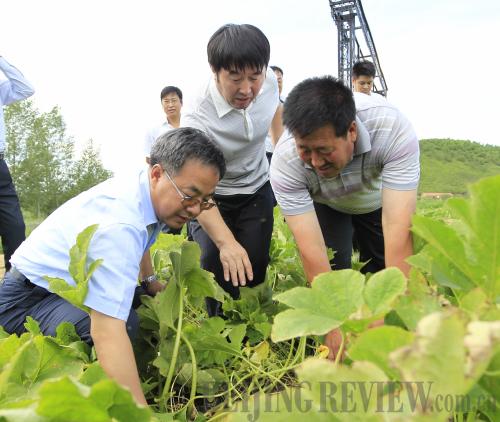|
 |
|
DOWN TO EARTH: Hu Chunhua (left), Party Secretary of Inner Mongolia Autonomous Region, visits a farmer's pumpkin garden on July 14, 2011. Hu is one of the youngest Party chiefs of China's provincial-level regions (XINHUA) |
On June 18, the Fourth Chongqing Municipal Congress of the Communist Party of China (CPC) started in the southwestern metropolis. In the following five days, more than 700 delegates outlined Chongqing's development blueprint for the next five years and elected a new local Party leadership.
There are 31 provinces, municipalities and autonomous regions on the Chinese mainland. Article 24 of the CPC Constitution stipulates that the Party congress of a province, autonomous region, or municipality directly under the Central Government is held once every five years. One of its functions is to elect the Party committee at the corresponding level, which is the top decision-making body of the locality. The newly elected Party committee will then hold a plenary session and elect a standing committee with a secretary as its leader, which will exercise the power of the committee when it is not in session.
The latest round of local Party leadership reshuffle in China started in October 2011 and is on track to be completed before the 18th National Congress of the CPC, which is scheduled later this year. By June 13, CPC organizations in 29 provinces, autonomous regions and municipalities under the Central Government had held their congresses and elected new leaders. Chongqing and Beijing, where the Party congress started on June 21, were the last two provincial-level regions to carry out the process.
Normally, the standing committee of a provincial-level Party committee has 12 or 13 members. The 29 newly elected provincial-level Party committees have 377 standing committee members. According to official information, 103 of them, or 27 percent, are doctorate holders.
The Party Committee of Tianjin Municipality elected a 13-member standing committee on May 26, which stood out for its academic strength. Seven standing committee members hold a doctor's degree, with their majors ranging from management, economics, law to literature.
"Undoubtedly, the trend is that more senior-degree holders from top universities will bring their expertise into management," said Wang Guixiu, a professor at the Party School of the Central Committee of the CPC.
Fields of current local Party leaders' studies span a wide spectrum, from crop-planting to state-of-the-art computing and technology-intense laser physics, according to their resumes. Many of the leaders with doctorates also give lectures in universities or conduct research in institutes.
Li Xiuling, 50, a standing committee member in charge of organization and staff affairs of the CPC Hainan Provincial Committee, was an associate professor of history at Nanjing University in the 1980s and 1990s.
There are four provincial Party chiefs with a doctor's degree. Wang Min, Party Secretary of northeastern Liaoning Province, used to be vice president of Nanjing University of Aeronautics and Astronautics in east China's Jiangsu Province, where he obtained his doctorate in mechanical engineering and taught in the 1980s and 1990s.
Yuan Chunqing, Party Secretary of Shanxi Province in north China, studied in Hunan University for a doctor's degree in management between 1994 and 1997 and conducted post-doctoral research at the School of Economics of Peking University between 1999 and 2001.
Guo Shengkun, Party Secretary of southwestern Guangxi Zhuang Autonomous Region, received a doctor's degree in management from the School of Economics and Management of University of Science and Technology Beijing in 2007.
Sun Zhengcai, Party Secretary of Jilin Province in the northeast, holds a doctor's degree in agriculture and once worked as a researcher at Beijing Academy of Agriculture and Forestry Sciences. Sun, former Minister of Agriculture, apparently has benefited from his strong background in a province that is a major producer of grains.
Zhu Lijia, a professor at the Chinese Academy of Governance, told People's Daily that the presence of leaders with strong and multidisciplinary education backgrounds will result in a leadership with comprehensive knowledge bases, strategic insight and more capacity to deal with social governance challenges in a modern society.
According to the Chongqing Morning Post, the average age of newly elected standing committee members of provincial-level Party committees, excluding one whose age information is unavailable, is 54.84. There are 66 people aged below 50 years, accounting for 17.55 percent of the total.
Among the 29 newly elected provincial-level Party chiefs, 22 were born in the 1950s, four in the 1940s and three in the 1960s. Born in September 1963, Sun, the top Party official of Jilin, is the youngest.
| 